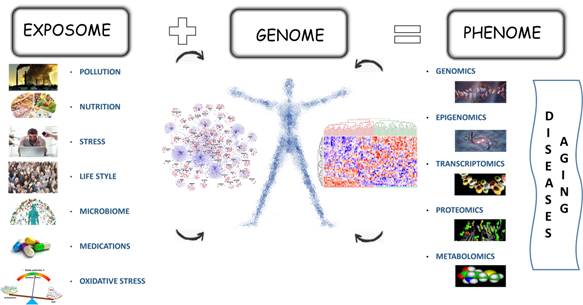Investigation of the role of the «Environment» in the etiology of disease and morbidity in humans.
The emerging concept of the "exposome" refers to the totality of the exposures suffered by an individual, coming from all sources, including the environment, food, and psycho-social components, from conception onwards. One of the key tools for developing and applying the exposome concept is the use of global sets of biomarkers (-omics) as generic measures of the internal exposome and disease risk. We focus on exploring the role of exposure to toxic environmental agents as a modulator of the epigenetic mechanisms of control of gene expression and hence of adverse health outcomes such as cancer and neurodevelopmental disorders. Cohort-based field studies and in vitro and in vivo studies are being implemented.
Selected Publications
- Vidali, M.-S., Dailianis, S., Vlastos, D., Georgiadis, P., PCB cause global DNA hypomethylation of human peripheral blood monocytes in vitro. Environ. Toxicol. Pharmacol., 2021, 87, 103696.
https://doi.org/10.1016/j.etap.2021.103696 - Georgiadis, P., Gavriil, M., Rantakokko, P., Ladoukakis, E., Botsivali, M., Kelly, R.S., Bergdahl, I.A., Kiviranta, H., Vermeulen, R.C.H., Spaeth, F., Hebbels, D.G.A.J., Kleinjans, J.C.S., de Kok, T.M.C.M., Palli, D., Vineis, P., Kyrtopoulos, S.A., DNA methylation profiling implicates exposure to PCBs in the pathogenesis of B-cell chronic lymphocytic leukemia. Environment international, 2019, 126, 24–36.
https://doi.org/10.1016/j.envint.2019.01.068 - Ek, W.E., Tobi, E.W., Ahsan, M., Lampa, E., Ponzi, E., Kyrtopoulos, S.A., Georgiadis, P., Lumey, L.H., Heijmans, B.T., Botsivali, M., Bergdahl, I.A., Karlsson, T., Rask-Andersen, M., Palli, D., Ingelsson, E., Hedman, A.K., Nilsson, L.M., Vineis, P., Lind, L., Flanagan, J.M., Johansson, A., Tea and coffee consumption in relation to DNA methylation in four European cohorts. Human Molecular Genetics, 2017, 26, 3221–3231.
https://doi.org/10.1093/hmg/ddx194 - Georgiadis, P., Liampa, I., Hebels, D.G., Krauskopf, J., Chatziioannou, A., Valavanis, I., de Kok, T.M.C.M., Kleinjans, J.C.S., Bergdahl, I.A., Melin, B., Spaeth, F., Palli, D., Vermeulen, R.C.H., Vlaanderen, J., Chadeau-Hyam, M., Vineis, P., Kyrtopoulos, S.A., Gottschalk, R., van Leeuwen, D., Timmermans, L., Botsivali, M., Bendinelli, B., Kelly, R., Portengen, L., Saberi-Hosnijeh, F., Hallmans, G., Lenner, P., Keun, H.C., Siskos, A., Athersuch, T.J., Kogevinas, M., Stephanou, E.G., Myridakis, A., Fazzo, L., Santis, M.D., Comba, P., Kiviranta, H., Rantakokko, P., Airaksinen, R., Ruokojärvi, P., Gilthorpe, M., Fleming, S., Fleming, T., Tu, Y.-K., Jonsson, B., Lundh, T., Chen, W.J., Lee, W.-C., Hsiao, C.K., Chien, K.-L., Kuo, P.-H., Hung, H., Liao, S.-F., Evolving DNA methylation and gene expression markers of B-cell chronic lymphocytic leukemia are present in pre-diagnostic blood samples more than 10 years prior to diagnosis. BMC Genomics, 2017, 18.
https://doi.org/10.1186/s12864-017-4117-4 - Georgiadis, P., Hebels, D.G., Valavanis, I., Liampa, I., Bergdahl, I.A., Johansson, A., Palli, D., Chadeau-Hyam, M., Chatziioannou, A., Jennen, D.G.J., Krauskopf, J., Jetten, M.J., Kleinjans, J.C.S., Vineis, P., Kyrtopoulos, S.A., Gottschalk, R., van Leeuwen, D., Timmermans, L., de Kok, T.M.C.M., Botsivali, M., Bendinelli, B., Kelly, R., Vermeulen, R., Portengen, L., Saberi-Hosnijeh, F., Melin, B., Hallmans, G., Lenner, P., Keun, H.C., Siskos, A., Athersuch, T.J., Kogevinas, M., Stephanou, E.G., Myridakis, A., Fazzo, L., De Santis, M., Comba, P., Kiviranta, H., Rantakokko, P., Airaksinen, R., Ruokojärvi, P., Gilthorpe, M., Fleming, S., Fleming, T., Tu, Y.-K., Jonsson, B., Lundh, T., Chen, W.J., Lee, W.-C., Kate Hsiao, C., Chien, K.-L., Kuo, P.-H., Hung, H., Liao, S.-F., Omics for prediction of environmental health effects: Blood leukocyte-based cross-omic profiling reliably predicts diseases associated with tobacco smoking. Scientific Reports, 2016, 6, 20544.
https://doi.org/10.1038/srep20544





